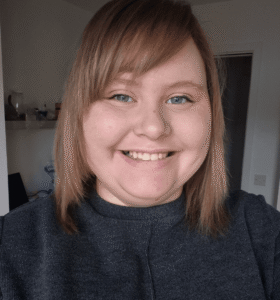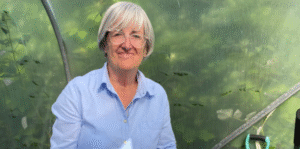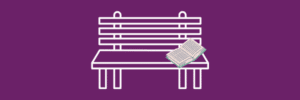Adrienne's story
Outside of my blog, I have been a featured writer/contributor for some organisations involved in mental health, and overall health and social care. One of which is the Humans of Scotland series for Alliance Scotland. After writing an opinion piece on Pro-Ana content for Alliance, I was contacted to be part of this series to talk about my mental health journey with an eating disorder. Then during the beginning of the lockdown in Scotland, and the UK, I was asked to write another piece about my anxiety and how was being impacted by the restrictions.
Alongside my story were the stories of other people in Scotland who are often the unheard members of society such as unpaid carers, chronic illness, people affected by suicide, people on the autistic spectrum, visual impairments, hearing impairments etc., This series gave a voice to people who were demanding to be heard and are often the ones to suffer when there are slashes to government budgets. There are a wide variety of contributors from all walks of life. It has been so well received that thirty stories were collated last year and put into a book which is available in libraries around Scotland. Scotland’s First Minister even wrote the foreword for it.
Following being part of this series, I contacted by Angela, who is the creator of the Humans of Scotland series, to be part of a Humans of Scotland panel as part of the online Alliance Scotland Conference this week. As with most conferences, and events in general, things have moved and adapted to online. So, I was to be involved in an event for Alliance wherein some stories were read by the contributors and then myself and two other contributors were members of the panel discussion where we discussed our own stories, the impact of COVID on our lives, and how we navigate day to day life. Adding to this, we discussed the power of telling our stories.
The contributors involved were:
- Celia: an unpaid carer who looks after her son twenty fours a day seven days a week.
- Gary: the founder of a male suicide prevention support group, Mind the Men.
- Twimukye: a woman with multiple conditions such as being hard of hearing, diabetes, and Retinitis Pigmentosa
- Michael: a freelance journalist who lives with a disability.
- Ryan: an athlete who has a diagnosis of Aspergers Syndrome.
I was there to represent my story of anxiety and an eating disorder. It was a completely wonderful and inspiring event for me, and I was so happy to participate.
Listening to the stories of these contributors and how they interact with everyday life, how they have had to make accommodations to ‘assimilate’ to a world that has not accommodated to them. It also made me realise that I, perhaps, have not been so accommodating myself, and it has given me things to think about.
And, this is, ultimately, the importance behind this initiative, behind telling these stories. This is why listening to lived experience is essential to building appropriate care and helping everyone. We listened to stories of people who were in financial trouble, because they were unable to work, because their son required full time care. A group that has had to be set up because of the epidemic of male suicide, particularly within Scotland. Myself, who went through years with undiagnosed anxiety, which was lengthened by a dismissive GP, and received no support or treatment for an eating disorder.
The power of storytelling is expansive. Lived experience demonstrates the great variety in people. But, it brings us together. I have noticed that when I share my experience of mental health that I get people reaching out to me to share their own experiences, with the majority of these wonderful people expressing the same feeling of: I am not alone.
That statement in itself shows the real power behind features like Humans of Scotland. It is not uncommon to feel like you are alone in your experience. When you feel that way, it can be lead to social withdrawal, a fear in reaching out for help, and feeling like you are abnormal. If there is trauma, then you can feel more to blame or that you are weird or something is wrong with you. However, hearing the story of another, a similar story, a similar circumstance, then you feel less alone. It doesn’t take away your trauma, or your difficulties, but it lessens the burden on you. I know that when I was unwell I felt like I was going mad. When I began to experience an eating disorder, I felt so incredibly alone and I felt like no one could understand me or help me.
However, when I joined Beat, I heard the stories of so many people around me who also had histories of eating disorders and other mental health difficulties and diagnoses. In doing so, I felt so comforted. I felt part of a community. I didn’t feel alone. I didn’t feel so strange anymore. I didn’t feel so ashamed.
Listening to lived experience is essential to building appropriate care and helping everyone.
Sharing your experience, when you are ready, can lessen the impact of the difficulty. As they say, a problem shared is a problem halved. Listening to others lived experiences can be beneficial in your recovery and how you cope. I know that volunteering in support services for Beat and offering what has worked for me in my recovery is very beneficial. If you see that something has worked for someone else then you may be more likely to try it, which is helpful when you are facing a new treatment, or reaching for financial help, or speaking up for injustice for you, or simply trying to disrupt a maladaptive practice you have dealt with. When I wrote a recent post on my experience with sertraline, it reached out to people who have had the same experience, and they were thankful that someone was speaking so frankly about it. In a way, that reduces the stigma. It reduces the shame, and normalises the experiences. And that’s the most important part.
Normalising experiences can lead to more people coming forward with their stories thus creating a stronghold of people. No one wants to be the first person to speak up, as it’s an entirely terrifying thing to do. But, when that one person steps forward, it can start a domino effect, and it’s the kind of domino effect that is fantastic and uplifting to see.
There is strength in stories. There’s strength in experiences. Being a Human of Scotland has been fantastic in sharing my own story, but also introduced me to so many unheard and dismissed voices. They are voices of hundreds of thousands of people in Scotland and they should be recognised and they should be heard. It is so wonderful to be a Human of Scotland, and I’m glad to be part of the experience.
Thank you for sharing your story, Adrienne.




